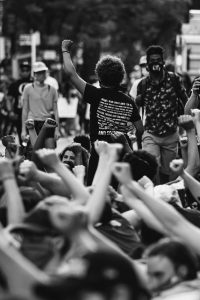Inequality is the fundamental cause for all social protesting and violence
- Cary Wu, Assistant Professor, Department of Sociology - York University

O que está a acontecer neste mundo? Por que razão assistimos a cada vez mais intensos e frequentes movimentos de verdadeira rebelião social em países onde, historicamente, se pratica o respeito pela autoridade e valores ditados pelas regras sociais? Como explicar eventos como o que assistimos todos, na semana passada, nos Estados Unidos da América? Como entender que se continuem a promover festas ou aglomerações de pessoas, sem garantir as regras ditadas pelas entidades que gerem a saúde pública?
Cary Wu, Assistant Professor, Department of Sociology – York University, explica nesta entrevista, que aceitou conceder ao Milénio Stadium, quais as razões de fundo para o enquadramento social deste “caldo” perigoso em que muitas sociedades estão a mergulhar. E o principal “ingrediente” é, na sua opinião, a ansiedade e até depressão coletiva que situações como a pandemia, a política de Trump, e o mau jornalismo estão a provocar. São em grande medida estes fatores que estão a gerar um clima de cada vez maior desconfiança que pode, por sua vez, provocar a ira e raiva contra o, até então, estabelecido. Cary Wu afirma, inclusivamente, que muitas vezes a falta de respeito pelas normas e instituições derivam do facto de os políticos não darem bons exemplos, já que muitas vezes eles próprios as desrespeitam. E quando as pessoas perdem a confiança em quem as lidera os conflitos e a quebra sistemática de regras podem aumentar, como forma de demonstrar a sua desconfiança e raiva. E tudo isto, alerta Cary Wu, danifica a coesão social o que, por sua vez, afeta o crescimento da economia. A solução passa, segundo o professor associado de Sociologia na York University, pela comunicação entre quem lidera e quem é liderado baseada em mensagens positivas e compreensão mútua. Cary Wu refere ainda que a iniquidade social, o cada vez maior fosso entre os que têm tudo e os nada têm, também é muito responsável pelo exacerbar da revolta e violência a que assistimos nos dias de hoje. Por fim, o nosso entrevistado refere ainda a importância das diversas plataformas de redes sociais se empenharem mais no controlo rígido dos conteúdos, com medidas mais restritivas que impeçam, por exemplo, a publicação de “fake news” ou a instigação/promoção da violência.
Milénio Stadium: In the face of various events, to a greater or lesser extent, which show disrespect for rules or laws, where are the values of respect for social institutions and rules?

Cary Wu: The pandemic, the trump politics, bias media have led to a widespread of anxiety, stress, depression worldwide. As a result, people have become more cynical and less trusting, and more easily provoked to anger by other people’s behaviors. This creates more negative emotions and leads to more stress.
Society can only function well with shared norms and respect for social institutions and rules.
The public can lose trust and respect for social institutions and rules especially when community and political leaders do not set example and show little respect for the institutions and rules.
The cases such as e.g. Rod Philips hurt public trust in officials, leading to feelings of betrayed, frustrated, and angry.
MS: What is failing? Is political leadership weak or are citizenship values not properly communicated to young people?
Cary Wu: Leadership and government performance certainly play a major role in making our society operate smoothly, particularly in times of crisis.
People have expectations for their government. Particularly, when crisis eg the COVID-19 occurs, their expectation increases because people’s health, economy etc are severely threatened. COVID-19 presents a situation where the government must demonstrate their leadership and competency immediately to safeguard community’s interest.
If the government cannot ensure people’s health and economy during this crisis, trust in government will diminish significantly, regardless of how much people trusted the government prior to the crisis.
Young people can be disproportionately affected by pandemic. Eg lost of job, school closed. All these affect their confidence and trust, leading to their deviant behaviors. When they are not satisfied with the government performance, demands are not met, conflicts could arise eg people breaking the rules. It is just a way to express their distrust and anger.
MS: What are the greatest dangers to humanity that can result from this evidence?
Cary Wu: People lose confidence in political institutions, and lose trust in people, and this will hurt social cohesion. Decrease in social cohesion will damage a wide range of individual and social benefits such as economic growth and public health.
MS: Who can “light up” the dark days we are living in?
Cary Wu: Positive message, and effective communication from government to the public. Mutual understandings from each other. Trust and concern for others. Social support, and family values. Maintain contacts with loved ones.
MS: Does increasing poverty exacerbate revolt and disorder?
Cary Wu: It is not necessarily poverty. In fact, the society has become overall richer globally. Instead, it is inequality, the widening gap between the rich and the poor, that exacerbates revolt and disorder.
For example, today, the housing prices rise significantly faster than income, and it has become impossible for young people to afford housing with an average income. They become stressed, discontent, angry at the government. They lose hope. They lose confidence that policymakers are working for their interests.
Inequality is the fundamental cause for all social protesting and violence we see today.
MS: In recent events in the United States, it has once again become evident how social networks can function as true promoters of public disorder. What changes can be made to the platforms to help avoid these situations?
Cary Wu: Yes, social networks can be used for good and also bad purposes. So the key question are what social networks, who are using them, and for what purposes. Answering these questions will help minimize the downside of social networks.
Social network platforms such as Twitter are powerful tools for advocating ideas to a broad audience and mobilizing resources quickly. So it is important to manage the platforms for creating public good, avoiding public bad. For example, implement stringent measures to prohibit users from posting fake news, and instigating/organizing non-peaceful collective actions.
Catarina Balça/MS








Redes Sociais - Comentários